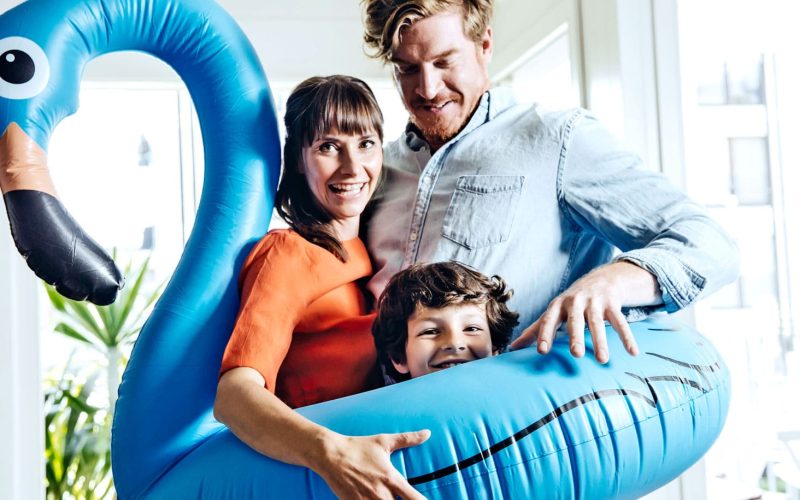Intensive Parenting, also known as Helicopter Parenting, is a style of Parenting in which parents are overly focused on their children.
In intensive Parenting, the parent pays exceptionally close attention to the child’s or children’s experiences and problems, particularly at educational institutions.
In this parenting style, parents feel a need to be intensely involved in the lives of their child or children. Intensive Parenting is also referred to as Helicopter Parenting.
Because, like helicopters, parents “hover overhead,” they constantly oversee every aspect of their child’s life.
A helicopter parent is also known to strictly supervise their children in all aspects of their lives, including social interaction.
What is Intensive Parenting?
Every parent wishes for their children to be happy and successful in life. But who wouldn’t leap at the chance to make their child’s life easier if given a chance?
While this is natural behavior, some parents take it further and hover over their children like helicopters. The best way to describe intensive Parenting (helicopter parenting) is as “over-involvement in a child’s life.”
It’s the polar opposite of free-range Parenting. This is when children are allowed to think for themselves.
It is also similar to lawnmower parenting, in which a parent “mows down” — so to speak — any issue a child may encounter so that they never feel hurt, discomfort, or disappointment.
While intensive Parenting has become widely discussed in recent years, it is no longer a new term.
Causes of Intensive Parenting?
Intensive Parenting has a variety of factors, and it may also be the result of deep-seated problems.
Knowing this will help you comprehend why someone feels compelled to be too involved in their child’s life. The following are some of the possible causes:
Fears About the Future of Their Children
Every parent is concerned about the future of their child or children, and some parents are ready to do anything to ensure their children’s success.
Some parents believe that what their child does today greatly impacts their future. Being intensely involved is a way to prevent struggles later in life.
They believe they know better and must guide the child and make decisions that may determine that child’s future.
A child getting a low grade in school, not doing well, and eventually getting cut from a sports team or not getting into the college of their choice can spark fears of uncertainty about their future.
Anxiety
Anxiety causes parents to become intensely involved in their children’s lives. Parents may become anxious about what is happening in their children’s lives and what they are going through at a particular time.
This may lead them to pry into the life of their child/children, getting involved in the child’s life. This may get very intense.
When they see their child injured or disappointed, some parents become nervous and emotional, and they will do all they can to prevent this from happening.
They do not know that disappointment and hurt are natural parts of life that help a child develop and become more resilient. (Consider how much we, as adults, accept that adversity has made us stronger.)
Trying to find purpose and fulfillment
Some parents try to find purpose in their child’s life. As such, they would not want them (the children) to make mistakes, make wrong decisions and choices, or do anything that could mar their greatness or success in life.
This leads the parent to become intensively involved in every area of the child’s life – from making friends and the company they keep to choosing a school, course of study, and everything else in the child’s life.
Intensive Parenting arises when a parent’s identity becomes entwined with their child’s accomplishments. The success of their child makes them feel like a better parent.
Overcompensation
Perhaps the overprotective parents didn’t feel loved or supported by their parents, vowing their children would never feel the same way. This is a perfectly natural, even admirable emotion.
Although this can break the cycle of neglect, some parents go too far and give their children more attention than is necessary.
Some parents may overdo it, getting too involved in their child’s life, sometimes without even knowing it.
Peer Pressure
Peer pressure isn’t associated with children or youths alone but also affects adults. So, parents who surround themselves with intensive parents might feel pressure to imitate this parenting style.
For fear that others will think they’re not as good of a parent if they don’t.
They feel being involved in the activities and happenings in the life of their child/children makes them a better parent than otherwise. They are pressured by other parents who have adopted Intensive Parenting.
What Are the Benefits and Consequences of Intensive Parenting?
Is Intensive Parenting Beneficial?
Intensive Parenting may be beneficial to some extent, at least for the parent. While it is a divisive modern parenting style, research shows that parents actively involved in their children’s lives are happier and have more meaning.
However, children do not always benefit from intensive Parenting. While some parents hover to give their children an advantage, other research indicates that over-involvement can cause some children to struggle in school and elsewhere.
Some Consequences of Intensive Parenting
Low self-esteem
Though viewed positively by some parents, Intensive Parenting can backfire and cause a child to develop low self-confidence or self-esteem.
Since children have never had to find out anything on their own, they will question their abilities as they grow older.
They may believe their parents don’t trust them to make their own choices and begin to doubt their ability to handle their lives.
Low self-esteem and low self-confidence can become so severe that they contribute to other issues, such as anxiety and depression. And these emotions don’t automatically go away as a child grows older.
Prone to Anxiety and Depression
Students raised by so-called intensive (helicopter) parents were more likely to be on anxiety and depression medication.
This is according to a report assessing the effect of this type of Parenting on college students. However, the study was restricted since it focused on a small, mostly female population in Turkey.
There’s also the possibility that a child will develop entitlement problems. They may feel they are entitled to such benefits because they always have what they want.
They grow up thinking that the universe will bend over backward to help them, which can lead to a rude awakening later in life.
Intensive Parenting Can Lead to Raising Over-Dependent Kids
Intensive Parenting may breed incapacitated individuals. Children who are brought up under this style of Parenting grow up with the conviction that they can not make reasonable decisions by themselves.
This may also lead to a high level of self-insufficiency, as they seek validation from others and are not sure of themselves or their abilities.
When their parents attempt to influence their lives, some children act out and become violent. Others are born with weak coping abilities.
They may lack conflict-solving skills because they did not learn how to cope with failure or disappointment in primary, high school, or college.
How to avoid intensive Parenting?
It may be difficult to let go of the reins, but that doesn’t make you any less of a caring, active parent.
You should reassure your child that you’re still there even though you don’t solve all of their problems.
Here’s how to break free and promote your child’s independence:
- Instead of focusing on the present, consider the possible long-term effects of intensive Parenting. Do you want your child to always depend on you to solve all his problems and make all his decisions, or do you want him to develop life skills for himself?
- If your children are old enough, allow them to do things themselves and resist the urge to interfere. It may be as simple as tying their shoes, cleaning their room, or choosing their clothes.
- Allow children to make their own age-appropriate decisions. Allow elementary students to choose their favorite extracurricular activities or hobbies and older students to choose their classes.
- Don’t intervene or attempt to resolve a conflict between your child and a friend, coworker, or boss. Teach them dispute-resolution skills on their own.
- Allow your child to make mistakes. We understand how difficult this is. On the other hand, not joining the squad or getting into the college of their dreams teaches them how to deal with disappointment.
- Children should be taught life skills like cooking, cleaning, laundry, face-to-face contact, and teacher communication.
Conclusion
When choosing a parenting style, consider how it will affect your child now and in the future.
Of course, every parent has gone above and beyond to make their child’s life easier at some stage. The issue arises when intensive Parenting becomes the norm, obstructing healthy growth.
You may not realize you’re “intensive parenting,” but there’s no denying you want the best for your kids.
Consider the child or adult you want them to become, and then tailor your parenting style to achieve that goal. You may find that taking a step back relieves a strain — yours and theirs.





